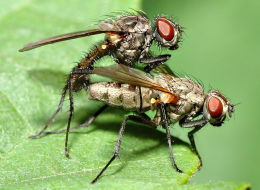In this scientific study, the authors examined how the weather—or, more specifically, atmospheric pressure changes – affects the sexual behavior of insect species, specifically the curcurbit beetle, the armyworm moth, and the potato aphid. They found that any change in the atmospheric pressure caused the bugs to be less frisky, likely to protect themselves in situations involving high winds and heavy rains.
 |
| Potato aphids were less interested in mating when pressure changes heralded a storm. |
Furthermore, 63 percent of males started copulating faster in the presence of females during dropping atmospheric pressure, a condition associated with high rains and winds. By contrast, under stable or rising air pressure conditions, all males showed full courtship behavior.
Additionally, the amount that female armyworm moths and potato aphids showed mate-attracting behavior was also measured under the three atmospheric conditions.
The female armyworms’ calling was reduced during decreasing air pressure, but the potato aphid showed reduced calling during both decreasing and increasing air pressure, two conditions that can occur with high winds. In both cases, reduced calling went hand-in-hand with reduced mating behavior.
 |
| Generic bug sex picture |
“However, there is a great deal of interspecific variability in their responses that can be related to differences in size, flight ability and the periodicity of mating.”
More at Nature and Discover, and here's the full study: Weather Forecasting by Insects: Modified Sexual Behaviour in Response to Atmospheric Pressure Changes
More at Nature and Discover, and here's the full study: Weather Forecasting by Insects: Modified Sexual Behaviour in Response to Atmospheric Pressure Changes
No comments:
Post a Comment